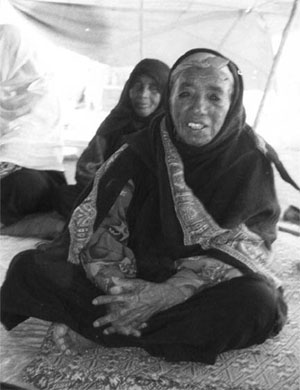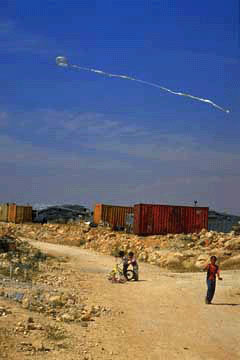
|
 |
| Hajji Thurayya, 'Jahileen Camp' (near Abu Dis). |
| Hajji Turfa, Hajji Khadra, Hajj Thuraya, and Hajji Ruqeyya, 'Jahileen camp', outside Jerusalem's Municipal boundary, June 16:
|
|
Bedouin of the Nagab suffered as much from displacement in (and after) 1948 as any other Palestinians - I would say more, because they had no institutions to protest against their treatment. Moreover displacement for them has been a continuous story, especially for those in parts of the West Bank categorized as 'C' under the Oslo Accords.
Suleiman Mazara'a (his family name means 'farmer') takes me to 'Jahileen camp'. He's the most educated member of this branch of the Jahileen, and is their official spokesman as well as working in UNRWA, where I first got to know him. 'Jahileen camp' is not a true bedouin settlement but an artificial one created when around 60 Jahileen families were forcefully expelled to make room for an expansion of Israel's largest settlement in the West Bank, Ma'aleh Adumim. The Jahileen are not the only Palestinians to have suffered through the expansion of Ma'aleh Adumim. It has grown at the expense of the villages of Abu Dis, 'Anata. al-'Izariyeh, at-Tur, and al-'Issawiyeh. When completed, this settlement will cover 35 square kilometers, reaching almost to Bethlehem in the south, to a hill above Jericho in the east, and to near Ramallah in the north. It will drive a wedge between the northern and southern West Bank. The roads connecting Ramallah to Bethlehem will be severed. To reach the camp, we go by communal taxi to al-'Izariyeh, on the road to Jericho. Just beyond the municipal boundary there is a high, bare, rocky hill part of which is covered with containers and packing crates, zinco-roofed. It's a position not only exposed to winter winds but also bad smells drifting up from Jerusalem's main garbage dump in the valley below. Suleiman tells me that his branch of the Jahileen was expelled from near Beer Sheba soon after 1948. They moved first to Hebron but found no grazing land there, then northwards to a well-watered site in the hills east of Jerusalem. There were nine ancient wells with water supplies that lasted all the year round, enough for them and other bedouin pastoralists in the whole valley. But in 1978 settlers began to build Ma'aleh Adumim. The Army laid roads and destroyed the wells by pouring cement in them. Two weeks after the signing of the Oslo Accords, in September 1993, these Jahileen families were served with eviction notices. They refused to leave unless they could return to their original home in the Nagab. Eventually, one night in February 1997, a large Army force bulldozed their homes and moved them in trucks to their present site. Many were wounded during transfer, others imprisoned.1 They raised a case but were accused of 'stealing' land belonging to a kibbutz. There's not a blade of grass on the whole hillside, and the few penned sheep remaining have to be fed on bought fodder. These Jahileen would like to continue producing meat and milk but are being squeezed |
out by cheaper Israeli produce. Yet young Jahileen men cannot find work, even if they manage to get through school.
Suleiman says that 90% of bedouin expelled from the Nagab are registered with UNRWA but some could not register because they lacked birth certificates. Typically they don't benefit from services because these are not mobile but concentrated in camps. Only bedouin within walking distance of village schools can get their children educated. This is a complaint I hear through the West Bank wherever there are bedouin settlements. One large black bedouin tent stands out among the box-like containers. It belongs to Suleiman's father, sheikh of this branch of the Jahileen. His father brought it with them from the Nagab. He says that another branch of Jahileen, the Sara'ya, who occupy a site not far from here along the Jericho road, are also being threatened with eviction, possibly to 'Jahileen camp'. The Israelis appear to have planned it as a dumping ground for Palestinian bedouin - a 'final solution' to unwanted pastoralists. Suleiman takes me to the women's side of the tent where his mother and aunts are sitting. They are introduced to me as Hajji Turfa, Hajji Khadra, Hajj Thurayya, and Hajji Ruqeyya. I record with them as a group, not insisting on the life story format. They tell me how good life used to be, how terrible it is now. They can't get permits to build. The roofs of their shacks fly off in the wind. Rats eat their food. UNRWA gives them nothing. But when I say that they should vote in the next Legislative elections to strengthen the bedouin 'voice', they say firmly, "We bedouin women don't vote". After the recording I wander about the camp and photo a bit (later I return with American photographer Sallie Shatz, who does a superb set of pictures that go around the world with an Oxfam exhibition). In the middle of the camp there's a large black barrel of water - open. A girl drinks from it, scooping up the water with her hand. Most of the children I see aren't wearing shoes. Suleiman speaks of the sharp deterioration in children's health since they were forced to abandon the pastoral way of life.
Hajji Turfa speaks: |
 |
| Jahileen camp (near Abu Dis) |
[Ferial Rasheed Khamis Abu Heykal] [Aida Obeid, Nabi Samuel] Copyright©2005 |
|